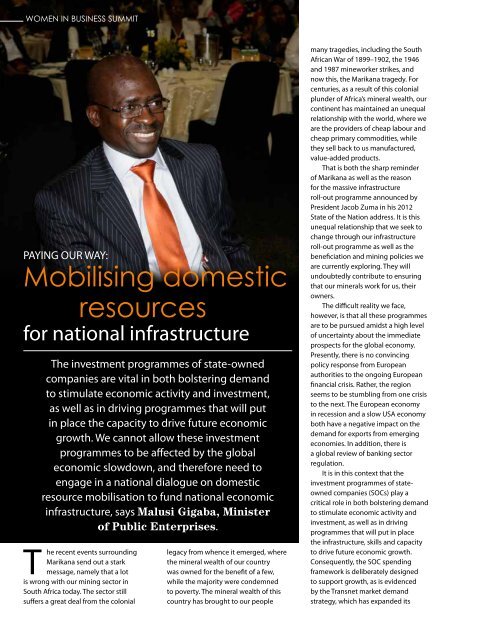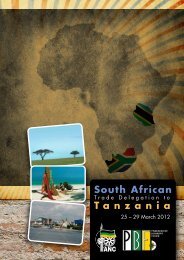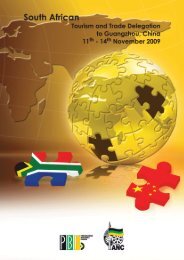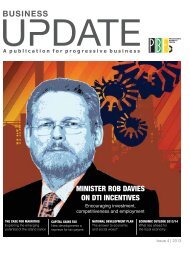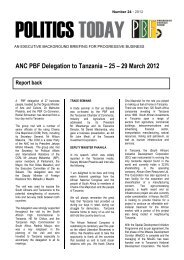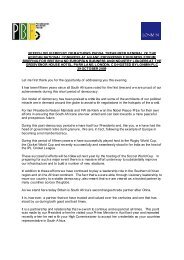WOMEN IN BUSINESS SUMMITPAYING OUR WAY:Mobilising domesticresourcesfor national infrastructureThe investment programmes of state-ownedcompanies are vital in both bolstering demandto stimulate economic activity and investment,as well as in driving programmes that will putin place <strong>the</strong> capacity to drive future economicgrowth. We cannot allow <strong>the</strong>se investmentprogrammes to be affected by <strong>the</strong> globaleconomic slowdown, and <strong>the</strong>refore need toengage in a national dialogue on domesticresource mobilisation to fund national economicinfrastructure, says Malusi Gigaba, Ministerof Public Enterprises.The recent events surroundingMarikana send out a starkmessage, namely that a lotis wrong with our mining sector inSouth Africa today. The sector stillsuffers a great deal from <strong>the</strong> coloniallegacy from whence it emerged, where<strong>the</strong> mineral wealth of our countrywas owned for <strong>the</strong> benefit of a few,while <strong>the</strong> majority were condemnedto poverty. The mineral wealth of thiscountry has brought to our peoplemany tragedies, including <strong>the</strong> SouthAfrican War of 1899–1902, <strong>the</strong> 1946and 1987 mineworker strikes, andnow this, <strong>the</strong> Marikana tragedy. Forcenturies, as a result of this colonialplunder of Africa’s mineral wealth, ourcontinent has maintained an unequalrelationship with <strong>the</strong> world, where weare <strong>the</strong> providers of cheap labour andcheap primary commodities, while<strong>the</strong>y sell back to us manufactured,value-added products.That is both <strong>the</strong> sharp reminderof Marikana as well as <strong>the</strong> reasonfor <strong>the</strong> massive infrastructureroll-out programme announced byPresident Jacob Zuma in his 2012State of <strong>the</strong> Nation address. It is thisunequal relationship that we seek tochange through our infrastructureroll-out programme as well as <strong>the</strong>beneficiation and mining policies weare currently exploring. They willundoubtedly contribute to ensuringthat our minerals work for us, <strong>the</strong>irowners.The difficult reality we face,however, is that all <strong>the</strong>se programmesare to be pursued amidst a high levelof uncertainty about <strong>the</strong> immediateprospects for <strong>the</strong> global economy.Presently, <strong>the</strong>re is no convincingpolicy response from Europeanauthorities to <strong>the</strong> ongoing Europeanfinancial crisis. Ra<strong>the</strong>r, <strong>the</strong> regionseems to be stumbling from one crisisto <strong>the</strong> next. The European economyin recession and a slow USA economyboth have a negative impact on <strong>the</strong>demand for exports from emergingeconomies. In addition, <strong>the</strong>re isa global review of banking sectorregulation.It is in this context that <strong>the</strong>investment programmes of stateownedcompanies (SOCs) play acritical role in both bolstering demandto stimulate economic activity andinvestment, as well as in drivingprogrammes that will put in place<strong>the</strong> infrastructure, skills and capacityto drive future economic growth.Consequently, <strong>the</strong> SOC spendingframework is deliberately designedto support growth, as is evidencedby <strong>the</strong> Transnet market demandstrategy, which has expanded its
WOMEN IN BUSINESS SUMMITcapital expenditure budget fromR110 billion over five years to R300billion over seven years, with 55% ofcapital expenditure earmarked forinvestments in new logistics capacity.Our energy investment planning isperformed through <strong>the</strong> integratedresource planning process driven by<strong>the</strong> Department of Energy. However,we are acutely aware that Eskom is<strong>the</strong> supplier of last resort, so we needto be extremely alert to ensuring thatadequate capacity is on hand in caseof problems in <strong>the</strong> broader energyroll-out. We also need to fund ourplanned nuclear programme, whichwill require a quantum of capitalunprecedented in our country’shistory.What is clear is that we cannotafford to allow this investmentprogramme to be affected by aneconomic slowdown. We need to belooking for ways to increase <strong>the</strong> scaleof <strong>the</strong> programme should <strong>the</strong> globaleconomy show signs of deceleratingfur<strong>the</strong>r. Of paramount importance isthat we find ways of streng<strong>the</strong>ning <strong>the</strong>SOC balance sheets. Strong balancesheets will decrease <strong>the</strong> price of debtfor SOCs and create a resource bufferto sustain <strong>the</strong> investment programme.More fundamentally, however, strongbalance sheets should create a highlevel of business confidence that<strong>the</strong> investment programmes will berolled out, regardless of a broadereconomic slowdown. This confidence iscore to re-igniting <strong>the</strong> private-sectorinvestment required to drive oureconomy both now and into <strong>the</strong> future.At <strong>the</strong> Department of PublicEnterprises, we have established anew division that will be focused ondeveloping innovative funding modelsto support and expand <strong>the</strong> investmentprogrammes. Our first port of call willbe to establish so-called ‘public/publicpartnerships’ with our developmentfinance institutions, particularly <strong>the</strong>Industrial Development Corporationand <strong>the</strong> Development Bank ofSou<strong>the</strong>rn Africa, which have <strong>the</strong>ability and <strong>the</strong> appetite to take equitytyperisks that will add to <strong>the</strong> balancesheets of <strong>the</strong> SOCs, which will in turnenable us to undertake some longtermprogrammes with confidence.In addition, we need to look toour major SOC customers to providebalance sheet support for big projects,particularly when a few companiesmake up <strong>the</strong> dominant users of <strong>the</strong>infrastructure. At a minimum, wewould expect <strong>the</strong>se companies toenter into long-term take-or-payarrangements, which will enable aproject-finance-type approach to <strong>the</strong>seprojects.We also need to learn frominnovations in o<strong>the</strong>r countries.For example, over 30 of <strong>the</strong> majorindustrial companies in Francepurchased 20 years’ electricity supplyupfront from EDF, which gave thatutility a significant start in fundingits infrastructure programme. Thiscould be done with rail as well. I amoptimistic that we can identify somequick wins in this area.At ano<strong>the</strong>r level, we need tounlock pension savings to fund <strong>the</strong>investment programme. Pensionfunds make excellent equity investors,as <strong>the</strong>y tend to be concerned with<strong>the</strong> long-term growth of <strong>the</strong> economy.Over time, I am sure that we willcreate structures for pension fundsto participate in SOC infrastructureprojects at an equity level. In <strong>the</strong>short term, we would also like to seeinstitutional investors play <strong>the</strong>ir partin supporting <strong>the</strong> SOC programmes on<strong>the</strong> bond markets. After all, <strong>the</strong> moreprogramme debt requirements fundedlocally at a reasonable cost of capital,<strong>the</strong> greater <strong>the</strong> potential for privatecompany growth.There’s a school of thought thatbelieves what we cannot fund locally,we can fund on <strong>the</strong> internationaldebt markets. Indeed, investorsentiment in developed economies at<strong>the</strong> moment is so poor that investorsare accepting negative returns onlow-risk dollar-denominated bondissues. Yet, a recent Transnet bondissue was oversubscribed by morethan 15 times. While we clearlyneed to take advantage of this, anumber of additional factors needto be taken into consideration,including <strong>the</strong> extreme instability of<strong>the</strong> international capital markets,higher costs related to internationalfunding, and emerging evidencethat developing countries whohave <strong>the</strong>mselves funded <strong>the</strong>ir owndevelopment have consistently shownmore effective economic growth thanthose overly dependent on foreigndebt. It would <strong>the</strong>refore be shortsightedto believe that we can plana sustained national investmentprogramme around consistent accessto reasonably priced foreign capital.Ra<strong>the</strong>r, we need to access mediumto long-term international capitalwhile we can, but cannot abdicate ournational duty to raise local resourcesto support our own infrastructureprogramme.This introduces our mostsignificant challenge. Over <strong>the</strong> lastfive years, our rate of investment hasoutstripped our savings rate by anaverage of 4–5% of gross domesticproduct. We already depend on <strong>the</strong>international markets to fund ourexisting current account deficit.Unless we do something to increasesavings, an expanded and acceleratedinvestment programme can only makethis gap increase, which will put<strong>the</strong> programme at risk. Our clarioncall, <strong>the</strong>refore, is that we need tostart a national dialogue on domesticresource mobilisation to fund nationaleconomic infrastructure and, wheresensible, introduce appropriateincentives to increase <strong>the</strong> nationalsavings rate.Unlike global financial markets,South African business is not in aliquidity crisis. The private sectoris paying off <strong>the</strong>ir debt and notre-investing <strong>the</strong> capital in <strong>the</strong>productive sectors of <strong>the</strong> economy.As government, we implore <strong>the</strong>private sector to be partners in<strong>the</strong> implementation of our growthstrategies, so that we can eradicatesocial inequality in South Africa. In<strong>the</strong>se globally turbulent times, <strong>the</strong>SOCs have a critical role to playin sustaining national investment,private-sector development andcompetitiveness. ✥<strong>Progressive</strong> women in business 13


